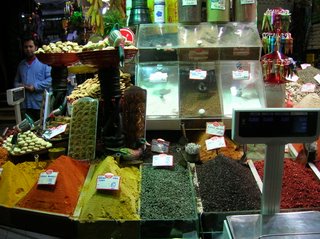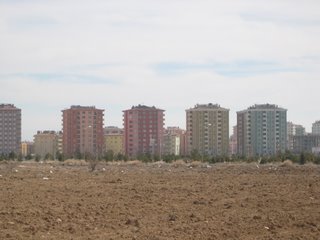Strong Hand, Deep State

While driving across the dusty plains to Konya, I see what I’ve come to term “Happy Khruschevsky” – endless fields of cookie-cutter apartment buildings, each one virtually indistinguishable from the next, save the two bright colors that adorn each—one on the outside walls, and the other on visible interior walls, such as balconies. Between these buildings lie scraps of dirt, little grass to be seen. This sea of identical buildings calls to mind the masses of apartment buildings on the outskirts of many Russian cities. These apartment buildings are often called “Khruschevsky,” after the Soviet leader in whose era these buildings were built. In Turkey these buildings are much cheerier than their drab counterparts in Russia. In many ways the similarities and differences in these buildings seem to reflect the comparisons between the two countries.

Both Russia (as the former U.S.S.R.) and Turkey formed out of the remnants of failing empires around World War I. The U.S.S.R. embarked on an experimental form of governing that consolidated all power and control in the hands of the State. Turkey, under the charismatic and forceful leadership of Mustafa Kemal Atatürk rapidly transited to a Republican Turkey. Both new governments loathed the empires they followed, and made huge efforts to cover the past with new, modern ideas. Both republics championed women’s rights, modernization, and broke with religion; Atatürk introduced the Latin alphabet.
Both countries (I am using this term, and the history, loosely) experienced tremendous state control over all aspects of life, including economics, politics, and religion. To this day, both Russia and Turkey have a name for this long-arm of government. In Russia it is known as “Strong Hand,” and describes parent-child relationship of government to people. Some Russian citizens, primarily the older ones, and especially in the pre-Putin era, longed for a return to the good old days when the government could be expected to do everything (such as providing a pension). In Turkey, this relationship is known as “Deep State” and describes the shadowy network of military, intelligence and government bureaucracy that has the final say in all matters—though it might not be a legal say.
Although the EU process is catalyzing a new, less powerful role for the military, the effects of Deep State are hinted at in the skepticism with which people approach uncommon people and ideas. At universities, I’ve been passed up the chain of command in order to ask students a series of questions regarding their involvement in civil society. I’ve learned that permission is the ultimate buzzword. Deep State is apparent in the February bombing of a bookstore owned by a man allegedly affiliated with the PKK, where the perpetrators were supposedly members of the Turkish security services.
However, like its buildings, Turkey puts up a cheerier front than its Northern former neighbor. Whatever comparisons between the two countries that I’ve seen, Turkey clearly experienced the milder version.

In my opinion, the demise of Deep State will depend on the success of the EU process and the attitudes of the AK Party and ensuing governments. However, given the skepticism with which many of the students that I’ve interviewed view the EU, perhaps Turkey’s membership is not a given. In which case, Deep State might continue operating in the shadows.

0 Comments:
Post a Comment
<< Home